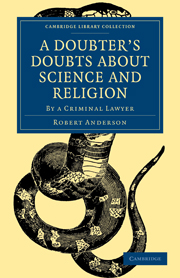Summary
“The rational attitude of a thinking mind towards the supernatural is that of scepticism.” Scepticism, remember; not agnosticism. “Agnosticism” is Greek for ignorance, and ignorance is disgraceful. We doubt, not because we wish to refuse knowledge, but because we crave certainty. In this sphere more than any other, we desire to guard against being imposed upon. What is presented to us as religion is for the most part a fraud. In this domain, no less than in the world of science, we are confronted at every step with some phase or other of our old friend “the confidence trick.” If only we will but accept as certain truth the unproved theories of the geologist, the facts he lays before us will commit us to his account of the origin and history of the habitable earth. If we will but adopt the unproved hypotheses of the evolutionist, he will betray us into the admission that man “came originally from stocks or stones, from nebulous gas or solar fire.” So, again, if we will but commit ourselves to the mystic power of the priest, he will secure for us mental peace and spiritual benefits in this world, and endless happiness in the next. Or, turning to the half-faith Christians, they too will promise the highest good, both here and hereafter, if only we will consent to make our home in the splendid edifice which they have built upon a quicksand.
- Type
- Chapter
- Information
- A Doubter's Doubts about Science and ReligionBy a Criminal Lawyer, pp. 117 - 126Publisher: Cambridge University PressPrint publication year: 2009First published in: 1889

